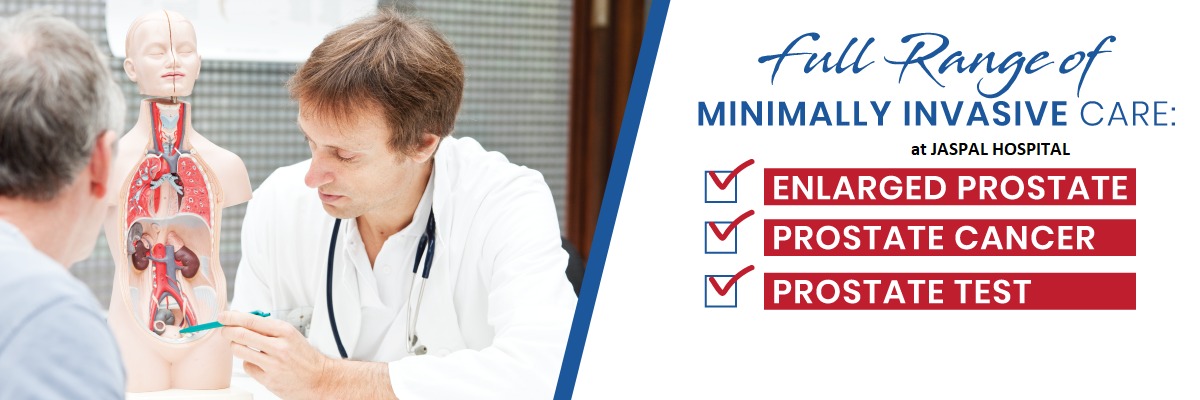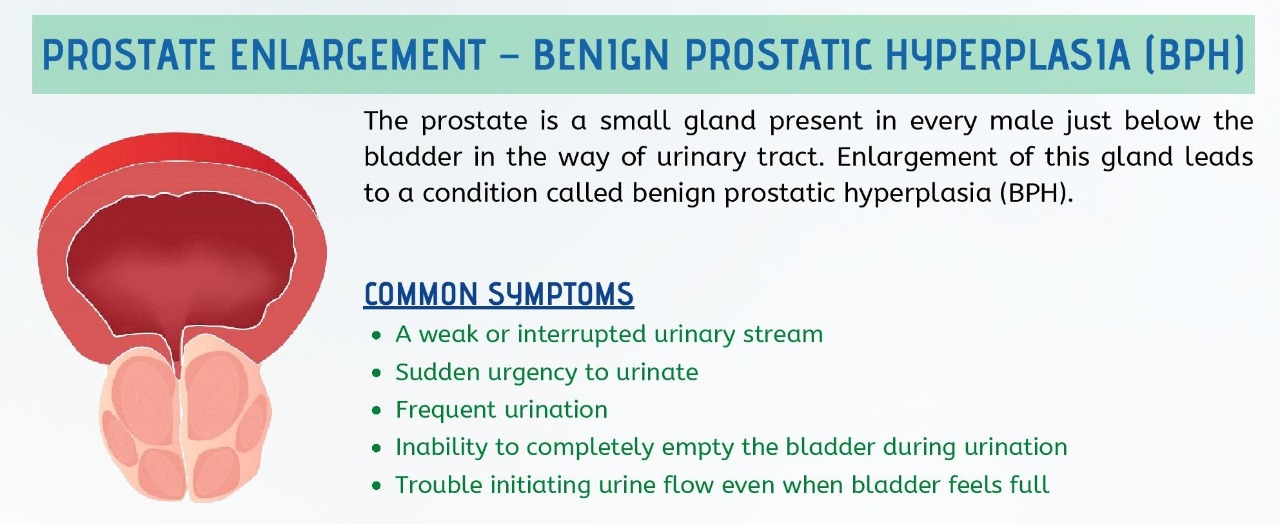Enlarged Prostate: A Complex Problem
All their life, they slept like a stone. But now, there’s an annoying trip to the bathroom every night, sometimes once or twice a night.
For most men, these nightly bathroom runs may be the first sign of an enlarged prostate. Other symptoms may include trouble starting a stream of urine, leaking, or dribbling. And, like gray hair, an enlarged prostate is a natural by-product of getting older, doctors say. Trouble is, the nightly bathroom runs become more frequent — eventually edging their way into the daytime routine.
Patients suffering from it can’t sit through a meeting or a plane flight without getting up. It’s very annoying … and when they have to go, they really have to go. It’s a problem that has several names — enlarged prostate, benign prostate hyperplasia, or simply BPH. According to the National Kidney and Urological Disease Information Clearinghouse, the most common prostate problem for men over 50 is prostate enlargement. By age 60, over one-half of men have BPH; by age 85, the number climbs to 90%.
Jaspal Hospital provides:
- Monopolar TURP
- Bipolar TURP
- Laser Treatment for Prostate
- Medical cure for uncomplicated prostate diseases.

In men, urine flows from the bladder through the urethra. BPH is a benign (noncancerous) enlargement of the prostate that blocks the flow of urine through the urethra. The prostate cells gradually multiply, creating an enlargement that puts pressure on the urethra — the “chute” through which urine and semen exit the body.
As the urethra narrows, the bladder has to contract more forcefully to push urine through the body.
Over time, the bladder muscle may gradually become stronger, thicker, and overly sensitive; it begins to contract even when it contains small amounts of urine, causing a need to urinate frequently. Eventually, the bladder muscle cannot overcome the effect of the narrowed urethra so urine remains in the bladder and it is not completely emptied.
Symptoms of enlarged prostate can include:
When the bladder does not empty completely, you become at risk for developing urinary tract infections. Other serious problems can also develop over time, including bladder stones, blood in the urine, incontinence, and acute urinary retention (an inability to urinate). A sudden and complete inability to urinate is a medical emergency; you should see your doctor immediately. In rare cases, bladder and/or kidney damage can develop from BPH.


Frequently Asked Questions
How do I know if my prostate is bad?
Symptoms of Prostate Problems
- Frequent urge to urinate.
- Need to get up many times during the night to urinate.
- Blood in urine or semen.
- Pain or burning urination.
- Painful ejaculation.
- Frequent pain or stiffness in lower back, hips, pelvic or rectal area,or upper thighs.
- Dribbling of urine.
How can I strengthen my prostate?
Various types of exercises can be helpful for men with prostate problems or OAB. Kegel exercises can strengthen and train your pelvic floor muscles to help control urination. Exercises such as walking, jogging, swimming, and tennis are also beneficial.
What happens when I have my prostate removed?
The major possible side effects of radical prostatectomy are urinary incontinence (being unable to control urine) and erectile dysfunction (impotence; problems getting or keeping erections). These side effects can also occur with other forms of prostate cancer treatment.
Can you check yourself for enlarged prostate?
Besides an at-home PSA blood test, there is no easy way to test yourself for prostate cancer at home. It’s recommended to see a physician for a digital rectal exam, as they have experience feeling prostates for lumps or enlarged prostate
Does an enlarged prostate affect a man sexually?
An enlarged prostate can cause sexual problems in men, such as: Erectile dysfunction (the inability to attain and maintain an erection sufficient for sexual intercourse at least 25% of the time) Reduced sex drive.
Does walking help your prostate?
In a study of more than 1,400 men diagnosed with early-stage prostate cancer, men who walked briskly (not leisurely) for at least three hours a week were 57% less likely to have their cancer progress than those who walked less often and less vigorously.
Where does sperm go after prostatectomy?
After radical prostatectomy (removal of the prostate) or cystectomy (removal of the bladder), a man will no longer produce any semen because the prostate and seminal vesicles have been removed. The testicles still make sperm cells, but then the body simply reabsorbs them.
What is the life expectancy after prostate removal?
In addition, radiation can be given after surgery if necessary, with a limited risk of any additional side effects. Patients who choose radical prostatectomy should: Be in very good health. Have a life expectancy exceeding 10 years.
Can you feel if your prostate is enlarged?
Symptoms of enlarged prostate can include: A weak or slow urinary stream. A feeling of incomplete bladder emptying. Difficulty starting urination.
Where do you feel prostate pain?
The prostate gland is situated just below the bladder and surrounds the urethra. Prostatitis is a disease of the prostate that results in pain in the groin, painful urination, difficulty urinating and other symptoms.
How often should a man release sperm?
This practice is the origin of the “24 times a year” idea. In fact, some Taoist teachers recommend that you only ejaculate 20 to 30 percent of the times you have sex. That translates to 2 or 3 times out of every 10 sessions.
Why is my prostate worse at night?
Urinating at night, which interrupts sleep, is called nocturia. A common urological condition causing nocturia in men is an enlarged prostate or benign prostatic hyperplasia (BPH). The enlarged prostate can close off the urethra, thus making the bladder contract harder to push out urine.


